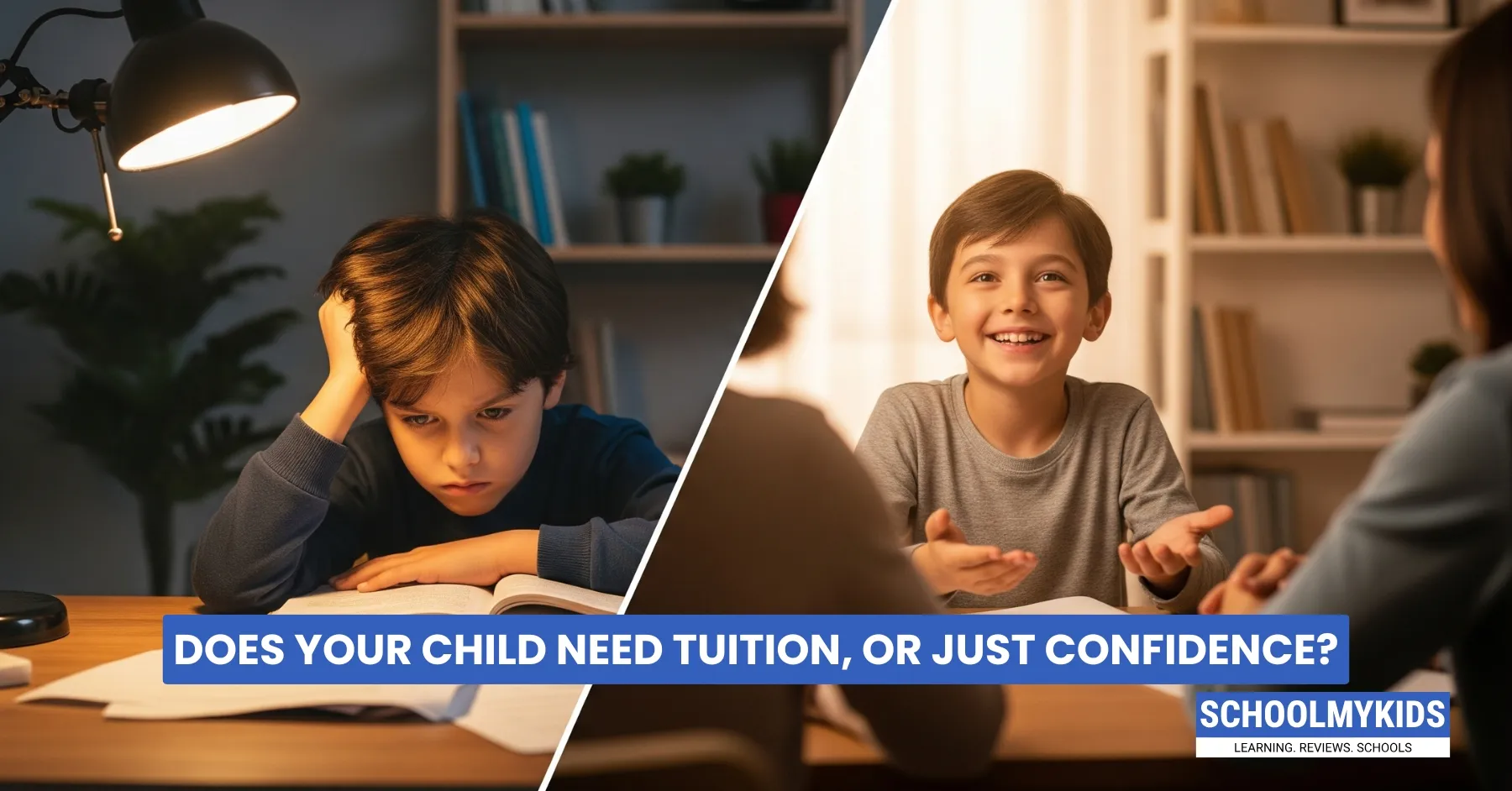Walk down any street in an Indian city today and you’ll see banners of coaching classes, posters of home tutors, and kids with backpacks rushing not just to school, but to tuition after tuition. It has become a way of life. School, then tuition, then homework, then more tuition work, then play if there’s time, and then bed. And the next day, the same cycle repeats.
From learning the alphabet to preparing for board exams, there’s a tuition center for everything. Somewhere along the way, extra classes stopped being “support” and became almost compulsory.
Parents often feel they have no choice. Some don’t feel equipped to teach their children themselves. Others don’t want their child to “miss out” when every neighbor’s kid is in extra math or science classes. And of course, everyone wants their children to perform better. Hiring tutors makes sense. But the question is: Does your child really need tuition, or does your child simply need confidence?
Why Parents Turn to Tuitions
There’s nothing wrong with seeking extra help. Many children struggle in certain subjects, and extra guidance can make a difference. Parents often look at tuitions because:
- They want their child to score higher and perform better.
- They feel unable to help due to lack of time or expertise.
- They see other kids around going for extra coaching.
- They believe expensive tuition equals quality learning.
But sometimes, extra classes don’t solve the actual issue. Sometimes, the child doesn’t lack knowledge; they lack confidence.
How Tuitions Can Backfire
- Dependency on Tutors: Many kids stop paying attention in school because they know “my tuition teacher will anyway teach this again.” This means school time is wasted.
- Overloaded Routine: Daily classes, followed by more tuition, can suffocate kids. They feel like life is just academics—with zero breathing space.
- Teachers Slacking: In some schools, teachers unconsciously expect kids to rely on tuition. “Why bother explaining in detail, when everyone already has a tutor?” That attitude weakens the purpose of school.
- Children Question Their Own Worth: If a child is sent to tuition at the first sign of struggle, they might think, “I must not be smart enough.” Confidence takes a hit, even more than marks.
Signs That Point To a Lack of Confidence (Not Lack of Knowledge)
Before enrolling a child in another set of classes, look for these signs:
- The child knows the answers at home, but freezes in class.
- Homework is done correctly, but class participation is low.
- The child avoids raising hands because of the fear of being wrong.
- They rely on friends’ notes even when they understand the topic.
- They improve when encouraged, not when corrected.
If these sound familiar, chances are the problem is not their ability, but their confidence.
How to Build Confidence Without Tuition
Here are some practical steps parents can take:
- Create a Safe “Mistake Zone” at Home: Children must feel at home that mistakes are allowed. Don’t scold for every wrong answer. Instead, ask, “What made you think this way?” This builds critical thinking and reduces fear of being wrong.
- Regularly Praise Effort, Not Just Results: Saying, “I noticed you tried solving that tough problem, and that’s great,” goes a long way. When effort is appreciated, confidence grows, and learning improves.
- Role-Play Classroom Situations: If your child hesitates answering in front of teachers, practice at home. Pretend to be the teacher. Ask a question. Encourage them to say the answer aloud and let them feel what confidence sounds like.
- One-on-One Time Matters: Setting aside just 30 minutes daily to go over what they learned in school can make more of a difference than hours of coaching. Your attention is more valuable than any paid class.
- Encourage Peer Teaching: Tell your child to explain a topic they’ve learned to you, a sibling, or a friend. Teaching someone else makes them feel knowledgeable and boosts self-esteem.
- Address the Fear of Marks: Many children underperform not because of a lack of knowledge, but because they panic in exams. Teach them exam writing techniques: time management, attempting easier questions first, and revising answers.
When Tuition Really Is Needed
Of course, not every situation is about confidence alone. Tuition may genuinely be helpful when:
- A child has major backlogs in concepts from previous years.
- School teaching quality is genuinely poor.
- Parents don’t have the time to revise or practice with the child.
- The child is targeting competitive exams beyond the school curriculum.
The key is balance. Tuition should be a tool, not a crutch. It should be treated as a support and not a replacement for schooling and self-study.
Conclusion
The tuition culture in India is growing by the day. But sometimes what a child needs is not another teacher, but a gentle push, a reminder that they can do it on their own. Confidence, when nurtured properly, can replace hours of extra classes.
So before enrolling in the next coaching program, pause and ask: Does my child really lack knowledge, or does my child just need to believe in themselves?
Confidence is cheaper than tuition, healthier than stress, and in the long run, a far more powerful gift to give your child than any certificate.








Be the first one to comment on this story.